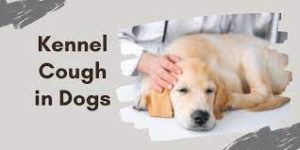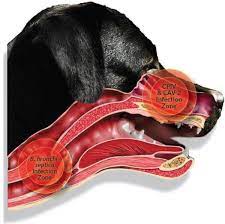
Kennel cough in dogs, also known as canine infectious tracheobronchitis, is a highly contagious respiratory infection in dogs. It’s characterized by a harsh, dry cough that can sound like a honking goose. While often harmless, cough disease can be uncomfortable for your dog and, in some cases, lead to more serious complications.
What Causes Kennel Cough?
This disease is caused by a combination of bacteria and viruses that infect the upper respiratory tract. The most common culprits include:
Bordetella bronchiseptica:
This is the most common bacteria associated with illnesses and is responsible for the characteristic honking cough.
Canine parainfluenza virus:
This virus is similar to the human parainfluenza virus and can cause respiratory symptoms, including coughing and sneezing.
Canine adenovirus type 2:
This virus is also a cause of this virus and is associated with more severe symptoms.
Other viruses and bacteria:
Several other viruses and bacteria can contribute to this virus, including canine coronavirus, canine distemper virus, and Mycoplasma.

Symptoms of Kennel Disease
The most noticeable symptom of the virus is a harsh, dry cough that may sound like a goose honking. This cough can be triggered by exercise, excitement, or exposure to cold air. Other symptoms of kennel cough may include:
Runny nose
Sneezing
Lethargy
Loss of appetite
Fever (in some cases)
How is Kennel Cough Diagnosed?
This disease can usually be diagnosed based on your dog’s clinical signs and history. However, your veterinarian may recommend additional tests, such as a chest X-ray or throat swab, to rule out other causes of respiratory illness.
Treating Kennel Cough
Most cases of this virus are mild and resolve on their own within 10-14 days. However, your veterinarian may prescribe medication to help relieve your dog’s symptoms and speed up recovery. Treatments may include:
Cough suppressants
Bronchodilators
Antibiotics (if a bacterial infection is present)
Preventing Disease
There are several things you can do to help prevent your dog from getting kennel cough:
Vaccination:
Vaccinating your dog against Bordetella bronchiseptica and canine parainfluenza virus is the most effective way to prevent kennel cough.
Minimize exposure:
Avoid taking your dog to places where they will be exposed to other dogs, such as dog parks and boarding kennels.
Keep your dog’s environment clean:
Regularly disinfect your dog’s toys and bedding to help prevent the spread of germs.
Boost your dog’s immune system:
Feeding your dog a healthy diet and providing them with regular exercise can help to boost their immune system and make them less susceptible to infections.
Additional Information
Here are some additional resources that you may find helpful:
Dr Alam Zeb Khan:
American Kennel Club:
WebMD:
Blue Cross:
Conclusion
This disease is a common respiratory infection in dogs that is usually mild and resolves on its own. However, it can be uncomfortable for your dog and, in some cases, lead to more serious complications. By understanding the symptoms, causes, and treatment options for this disease, you can help to keep your dog healthy and happy.





